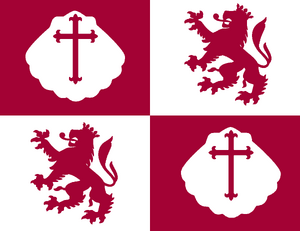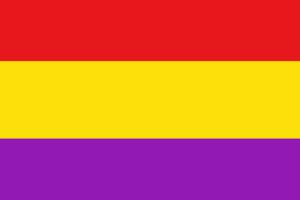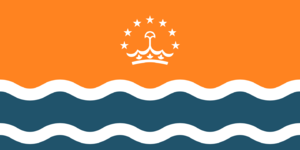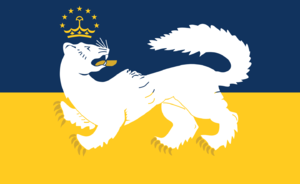More actions
No edit summary |
No edit summary |
||
| (14 intermediate revisions by 2 users not shown) | |||
| Line 1: | Line 1: | ||
{{CorpRP Nation Infobox|title1=The Balancín Kingdoms|image1= | {{CorpRP Nation Infobox|title1=The Balancín Kingdoms|image1=BalancKingdomsFlag.png|caption1=Flag of the Balancín Kingdoms|capital=Balancía|official_languages=Bonitanan Spanish | ||
English|government=Unitary parliamentary executive monarchy | English|government=Unitary parliamentary executive monarchy|head_of_state=[[Maximilian II]]|formation=2 August 3023 by the Royal Charter|demonym=Balancín}}The '''Balancín Kingdoms''', commonly known as '''Balancía''' after the capital, is a constituent country in the east of the Doggerlands. The Balancín Kingdoms is comprised of several kingdoms, principalities, and guilds, all of which operate under a central monarchical government, but each with their own respective noble administrations. As a Christian monarchy, the Balancín Kingdoms is firmly within the world of Christendom as a majority Pontifical state. | ||
The | The Balancín Kingdoms was formed by the [[Royal Charter of the Balancín Kingdoms|Royal Charter]], signed by [[Maximilian II|King Maximilian the Crusader]], when he proclaimed the independence of Balancía, Newton, and Shipley from the Wiltshire Republic, in August 3023. The Kingdoms claim direct succession from the independent Kingdom of the Rock, which was formed in 2640 when King Philip I declared independence from the [[Madrilene Empire]]. The reigning House of the Kingdoms, the House of Murcia, claims direct continuation from the Murcian Kings who established the Kingdom of the Rock back in the 2640s, making the Balancín Kingdoms arguably the oldest state in the Doggerlands. In 3024, at the end of the Wiltshire Civil War, the Balancín Kingdoms conquered all of Wiltshire, incorporating it into the Kingdom of Wiltshire and Heuvelberg. | ||
The Balancín Kingdoms is an executive constitutional monarchy, where the reigning monarch holds significant executive power. There are democratic elements of the government, however, with the lower house of Parliament, the General Courts, being partially elected by the citizenry. However, most of the power of the Kingdoms is held by the [[Balancín Nobility|nobility]]. The Balancín Kingdoms maintain a feudal noble structure, with positions of nobility corresponding to ownership and management of land. The Kingdoms are split into 12 duchies, which are then in turn split into dozens of fiefs and fiefdoms, which are held by lesser lords. Each lesser lord is a vassal of their duke, who are in turn vassals to the Crown. This system of vassalage is how the Kingdoms' tax and administration is organised. | |||
The Balancín Kingdoms is an executive constitutional monarchy, where the reigning monarch holds significant executive power. There are democratic elements of the government, however, with the lower house of Parliament, the General Courts, being partially elected by the citizenry. However, most of the power of the Kingdoms is held by the nobility. The Balancín Kingdoms maintain a feudal noble structure, with positions of nobility corresponding to ownership and management of land. The Kingdoms are split into 12 duchies, which are then in turn split into dozens of fiefs and fiefdoms, which are held by lesser lords. Each lesser lord is a vassal of their duke, who are in turn vassals to the Crown. This system of vassalage is how the Kingdoms' tax and administration is | |||
== Politics and nobility == | == Politics and nobility == | ||
<blockquote>''See main article: [[Balancín Monarchy]], [[ | <blockquote>''See main article: [[Balancín Monarchy]], [[Balancín Parliament]], [[Balancín Witan]]''</blockquote>The constitution of the Balancín Kingdoms is centred around the monarchy. The Royal Charter of 3023, which is the primary constitutional text of the Kingdoms, describes the King of the Balancín Kingdoms as "the power of the state", which is "embodied" through him. Through this, then, all executive and governmental power of the Kingdoms is derived from the King. By the Royal Charter, the King has dispensed many of these powers to the Government of the Balancín Kingdoms and the Parliament of the Balancín Kingdoms. Unlike in the former Wiltshire Republic, where their legislature was sovereign, the power of the Balancín Parliament is granted by the consent of the King. | ||
The government is headed by two key individuals, as outlined by the Royal Charter: the [[ | The government is headed by two key individuals, as outlined by the Royal Charter: the [[Lord Keeper of the King's Seal]] (known as the Lord Keeper) and the [[Lord Treasurer]]. Both positions are appointed by the King directly. However, the Royal Charter instructs holders of both offices to "covet" the support of Parliament and to "make endeavours" to gain such support. Despite this, Parliament cannot legally mandate the resignation of the government. Besides the Lord Keeper and Lord Treasurer, there are other senior government noblemen that make up the Witan. The Witan, along with the Lord Keeper and Lord Treasurer, comprise an informal cabinet which directs the administration of the government. | ||
=== Parliament === | === Parliament === | ||
| Line 103: | Line 33: | ||
=== Guilds === | === Guilds === | ||
The system of Guilds is the Balancín Kingdoms' form of | The system of Guilds is the Balancín Kingdoms' form of registering companies and corporations that operate within her, for tax and regulatory purposes. The status of a limited guild (LGs) is given to most corporations. LGs report directly to the central government and so are not subject to the taxing or regulatory operations of the lesser lords. Special rights and privileges are given to landed guilds, known as patented guilds (PGs), which do not report to the government but report directly to the Crown. PGs often are subject to less tax and regulations than standard LGs. | ||
The highest rank of Guild is the Incorporated Guilds (IGs), or guild stations, which have the most autonomy of any political division of the Balancín Kingdoms. There are currently three IGs: Shore, Obragon, and | The highest rank of Guild is the Incorporated Guilds (IGs), or guild stations, which have the most autonomy of any political division of the Balancín Kingdoms. There are currently three IGs: Shore, Obragon, and Asturias. IGs are subject to the least taxation of any guild and have very few internal regulations with respect to worker rights. Of particular note is that of public holidays, which IGs are not subject to. | ||
== Geography == | == Geography == | ||
| Line 116: | Line 46: | ||
!Flag | !Flag | ||
|- | |- | ||
| | |The Balancín Kingdoms | ||
|[[File:BalancKingdomsFlag.png|thumb]] | |||
|- | |||
|Balancía | |||
----''Kingdom of the Rock'' | ----''Kingdom of the Rock'' | ||
|[[File:Rockfield.png|thumb]] | |[[File:Rockfield.png|thumb]] | ||
| Line 131: | Line 64: | ||
----''Free City of Southern Bonitana'' | ----''Free City of Southern Bonitana'' | ||
|[[File:Southern Bonitana (2).png|thumb]] | |[[File:Southern Bonitana (2).png|thumb]] | ||
|- | |||
|Wiltshire | |||
----''Kingdom of Wiltshire and Heuvelberg'' | |||
|[[File:Potential Wiltshire flag-2.png|thumb]] | |||
|- | |- | ||
|Shore | |Shore | ||
| Line 146: | Line 83: | ||
=== Duchies === | === Duchies === | ||
The Kingdoms and principalities are divided up into duchies, which refer to areas of land that are ruled by Dukes (vassals of the Crown). | |||
{| class="wikitable" | {| class="wikitable" | ||
|+ | |+ | ||
!Duchy | !Duchy | ||
!Ruling Lord | !Ruling Lord | ||
!Ruling House | !Ruling House | ||
|- | |- | ||
| | |The Crownlands | ||
|[[John II]] | |||
| | |||
----King of the Balancín Kingdoms | ----King of the Balancín Kingdoms | ||
|House | |House Alba | ||
|- | |- | ||
|Mountbatten | |Mountbatten | ||
| | | rowspan="2" |Felix Amerigo | ||
----Duke of Mountbatten & Valls | |||
----Duke of Mountbatten | | rowspan="2" |[[House Amerigo]] | ||
|House | |||
|- | |- | ||
|Valls | |Valls | ||
|- | |- | ||
|Belemadena | |Belemadena | ||
|[[Jamie Calvo, Duke of Belemadena|Jamie Calvo]] | |[[Jamie Calvo, Duke of Belemadena|Jamie Calvo]] | ||
----Duke of Belemadena | ----Duke of Belemadena | ||
|House | |[[House Calvo]] | ||
|- | |- | ||
|Ander | |Ander | ||
|Jason Ander | |Jason Ander | ||
----Duke of Ander | ----Duke of Ander | ||
|House | |[[House Ander]] | ||
|- | |- | ||
|Newton | |Newton | ||
|[[Louis, Duke of Talaga|Louis]] | |[[Louis, Duke of Talaga|Louis]] | ||
----Prince of the Newton | ----Prince of the Newton | ||
|House | |[[House Murcia]] | ||
|- | |- | ||
|Estaire | |Estaire | ||
|Skylar Clay | |Skylar Clay | ||
----Duke of Estaire | ----Duke of Estaire | ||
|House | |[[House Clay]] | ||
|- | |- | ||
|Shipley | |Shipley | ||
|Sian Grayson-Wark | |Sian Grayson-Wark | ||
----Duchess of Estaire | ----Duchess of Estaire | ||
|House | |[[House Wark]] | ||
|- | |- | ||
|Farleigh | |Farleigh | ||
|Alec Casterel | |Alec Casterel | ||
----Duke of Farleigh | ----Duke of Farleigh | ||
|House Casterel | |[[House Casterel]] | ||
|- | |- | ||
| | |Alba | ||
| | |Mark Alba | ||
----Duke of Alba | |||
----Duke of | |[[House Alba]] | ||
|House | |||
|- | |- | ||
| | |Montrose | ||
|Kamari Tartary | |Kamari Tartary | ||
----Duke of | ----Duke of Montrose | ||
|House | |[[House Tartary]] | ||
|- | |- | ||
|Carolina | |Carolina | ||
|Luca Stamos | |Luca Stamos | ||
----Duke of Carolina | ----Duke of Carolina | ||
|House | |[[House Stamos]] | ||
|} | |} | ||
[[Category:Alive]] | |||
[[Category:Governments]] | |||
[[Category:National Government]] | |||
Latest revision as of 09:29, 26 October 2025
The Balancín Kingdoms, commonly known as Balancía after the capital, is a constituent country in the east of the Doggerlands. The Balancín Kingdoms is comprised of several kingdoms, principalities, and guilds, all of which operate under a central monarchical government, but each with their own respective noble administrations. As a Christian monarchy, the Balancín Kingdoms is firmly within the world of Christendom as a majority Pontifical state.
The Balancín Kingdoms was formed by the Royal Charter, signed by King Maximilian the Crusader, when he proclaimed the independence of Balancía, Newton, and Shipley from the Wiltshire Republic, in August 3023. The Kingdoms claim direct succession from the independent Kingdom of the Rock, which was formed in 2640 when King Philip I declared independence from the Madrilene Empire. The reigning House of the Kingdoms, the House of Murcia, claims direct continuation from the Murcian Kings who established the Kingdom of the Rock back in the 2640s, making the Balancín Kingdoms arguably the oldest state in the Doggerlands. In 3024, at the end of the Wiltshire Civil War, the Balancín Kingdoms conquered all of Wiltshire, incorporating it into the Kingdom of Wiltshire and Heuvelberg.
The Balancín Kingdoms is an executive constitutional monarchy, where the reigning monarch holds significant executive power. There are democratic elements of the government, however, with the lower house of Parliament, the General Courts, being partially elected by the citizenry. However, most of the power of the Kingdoms is held by the nobility. The Balancín Kingdoms maintain a feudal noble structure, with positions of nobility corresponding to ownership and management of land. The Kingdoms are split into 12 duchies, which are then in turn split into dozens of fiefs and fiefdoms, which are held by lesser lords. Each lesser lord is a vassal of their duke, who are in turn vassals to the Crown. This system of vassalage is how the Kingdoms' tax and administration is organised.
Politics and nobility
See main article: Balancín Monarchy, Balancín Parliament, Balancín Witan
The constitution of the Balancín Kingdoms is centred around the monarchy. The Royal Charter of 3023, which is the primary constitutional text of the Kingdoms, describes the King of the Balancín Kingdoms as "the power of the state", which is "embodied" through him. Through this, then, all executive and governmental power of the Kingdoms is derived from the King. By the Royal Charter, the King has dispensed many of these powers to the Government of the Balancín Kingdoms and the Parliament of the Balancín Kingdoms. Unlike in the former Wiltshire Republic, where their legislature was sovereign, the power of the Balancín Parliament is granted by the consent of the King.
The government is headed by two key individuals, as outlined by the Royal Charter: the Lord Keeper of the King's Seal (known as the Lord Keeper) and the Lord Treasurer. Both positions are appointed by the King directly. However, the Royal Charter instructs holders of both offices to "covet" the support of Parliament and to "make endeavours" to gain such support. Despite this, Parliament cannot legally mandate the resignation of the government. Besides the Lord Keeper and Lord Treasurer, there are other senior government noblemen that make up the Witan. The Witan, along with the Lord Keeper and Lord Treasurer, comprise an informal cabinet which directs the administration of the government.
Parliament
The Parliament of the Balancín Kingdoms is the legislative branch of the government. It consists of two houses: the General Courts (lower house) and the King's Court (upper house). The King's Court is the house of nobility, with members (Peers) holding noble rank. The nature of this setup means that the King's Court is a body which seldom meets in its entirety. In addition, the clergy is also represented in the King's Court. The King's Court holds equal power to the General Courts but often votes by consensus and acclamation, rather than traditional voting.
The General Courts, in contrast, operate far more like a traditional legislative body. The General Courts is comprised of 24 seats (MPs), each representing a certain element of Balancín society. Half of the seats (12) are directly elected in first-past-the-post district-based elections. The remaining 12 come from certain interest groups and functions of society that operate for "the effective governance of the Kingdoms". The breakdown of seats works as follows:
General Courts seat breakdown
12 seats: democratically elected by the general citizenry
7 seats: selected by the Guilds
3 seats: selected by centers of charity, culture, and learning (e.g., 1 seat for the University of Southern Bonitana)
2 seats: selected by centers of commerce to represent the merchant class (e.g., 1 seat for the Harbour)
The purpose of the non-democratic seats of the General Courts is to give representation to those elements of society that allow it to function more effectively.
Succession
Given the Balancín Kingdoms' status as an executive monarchy, the issue of the succession is one that is pressing to the political state of the nation. Noble titles are created by the King and are all inheritable. The succession typically follows an absolute primogeniture (where titles are inherited by the first born legitimate child, regardless of gender). There is a certain degree of freedom in the succession, with the last will and testament of a holder of noble titles carrying legal weight. However, titles and lands are unable to be divided between siblings. In addition, succession cannot be granted to individuals who are legally barred from inheritance, such as those excommunicated from the Pontifical Church.
The succession of the Crown, however, works differently and is significantly more rigid than the succession of lesser noble titles. The crown may only be inherited by Pontifical, male-only descendants of King Antony Edmund II. The Crown is unique in the Balancín Kingdoms, in that females are unable to inherit. However, the Crown may pass through a female line, provided it is not inherited by a female. This is owing to the Crown's unique position as a Papal Legate of the Pontifical Church.
The succession of the Crown is marked by a series of events. Firstly, upon the death of the Crown, there will be an automatic dissolution of Parliament. The purpose of this is to give Peers and MPs the opportunity to swear allegiance to the new King. The pledging of allegiance and oaths of fealty occur during the Ascension Council, a required event before the recalling of a new Parliament. The Ascension Council formally proclaims the new King, prior to his coronation.
Guilds
The system of Guilds is the Balancín Kingdoms' form of registering companies and corporations that operate within her, for tax and regulatory purposes. The status of a limited guild (LGs) is given to most corporations. LGs report directly to the central government and so are not subject to the taxing or regulatory operations of the lesser lords. Special rights and privileges are given to landed guilds, known as patented guilds (PGs), which do not report to the government but report directly to the Crown. PGs often are subject to less tax and regulations than standard LGs.
The highest rank of Guild is the Incorporated Guilds (IGs), or guild stations, which have the most autonomy of any political division of the Balancín Kingdoms. There are currently three IGs: Shore, Obragon, and Asturias. IGs are subject to the least taxation of any guild and have very few internal regulations with respect to worker rights. Of particular note is that of public holidays, which IGs are not subject to.
Geography
The Balancín Kingdoms is a country of countries, which means that it is comprised of a number of different Kingdoms, principalities, and free cities. The status of Kingdom is a ceremonial one, and typically refers to an historical boundary that is respected within the Kingdoms. The government is unitary and centralised, meaning that authority is central. However, for taxation and regulatory purposes, the Kingdom is divided into 12 administrative zones, known as Duchies, which carry out a number of governmental functions.
Kingdoms
Duchies
The Kingdoms and principalities are divided up into duchies, which refer to areas of land that are ruled by Dukes (vassals of the Crown).
| Duchy | Ruling Lord | Ruling House |
|---|---|---|
| The Crownlands | John II
King of the Balancín Kingdoms |
House Alba |
| Mountbatten | Felix Amerigo
Duke of Mountbatten & Valls |
House Amerigo |
| Valls | ||
| Belemadena | Jamie Calvo
Duke of Belemadena |
House Calvo |
| Ander | Jason Ander
Duke of Ander |
House Ander |
| Newton | Louis
Prince of the Newton |
House Murcia |
| Estaire | Skylar Clay
Duke of Estaire |
House Clay |
| Shipley | Sian Grayson-Wark
Duchess of Estaire |
House Wark |
| Farleigh | Alec Casterel
Duke of Farleigh |
House Casterel |
| Alba | Mark Alba
Duke of Alba |
House Alba |
| Montrose | Kamari Tartary
Duke of Montrose |
House Tartary |
| Carolina | Luca Stamos
Duke of Carolina |
House Stamos |






